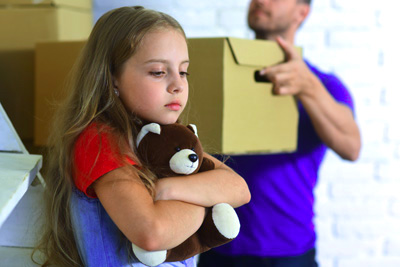
Moving with kids
Making your move easier…on everyone.
Moving is stressful. But packing, saying goodbye to friends and adjusting to a new home is extra hard on kids. So whether you’re moving with toddlers or teens, here are a few tips for a stress-free (okay, less stressful) experience for adults and offspring alike.
Talk to them
Don’t just spring a move on your kids. Tell them as soon as possible so they have plenty of time to think about it. Talk about where are you are moving to and why. Point out the benefits of the new home (it’s bigger, closer to school, in an exciting city, etc.) and the opportunities it offers for them specifically.
Listen
Encourage them to ask questions and express their anxieties and fears. Ask them to make a list of questions and present them at a family meeting.
Reassure
Tell kids that although their home will be changing, their life will stay pretty much the same; they will still have a back yard, for example, go to school, live with their siblings, parents and pets, and sleep in the same bed.
Involve them
Empower your kids by letting them make as many decisions as possible. Encourage them to plan their new bedroom by picking paint colours or thinking up furniture arrangements. They can help with packing and other chores, research the new neighbourhood, and take care of pets on moving day. And if you’re up for it, kids can even help with house-hunting, and have their say in choosing your family’s new home.
Make it an adventure
Stay positive; your attitude will influence theirs. Talk about all the great stuff they’ll get to do, the interesting programs they can take part in. Tell them if there’s an ice-cream shop around the corner or a great playground nearby. Organize a scavenger hunt to get to know your new neighbourhood (better yet, invite other kids on the street to take part).
Do your homework
Dealing with the unknown makes children anxious. Show them what to expect by getting plenty of info on the new neighbourhood, the new school, part-time job options for older kids, social activities and sports. Show them maps, photos, and explore the area together before you move.
Consider timing
Ideally, summer moves are best, so kids don’t have to start in a new school in the middle of the year. But if a mid-year move is your only option, talk to your children’s teachers to find out how to make the transition as painless as possible. Either way, take a tour of the school together before starting classes so your kids know what to expect.
Pack a kids’ survival box
Fill it with stuff they’ll need to feel at home the first night and morning in the new place. Include their favourite snacks, toys, books, photos, a change of clothes, slippers, camera, MP3 player, pjs, toothbrush, etc.
Say goodbye
Throw a “farewell” party to say bye to friends and celebrate your new adventure. Visit favourite places one last time. Then, when your home is empty, take a walk through each room and talk about the all memories you made there.
Take keepsakes
Take pictures or a video of your home and the kids’ favourite people and places. Make a scrapbook with photos of friends and neighbours, and have them write their addresses and other messages beside their photos so that your kids can keep in touch.
On moving day, get a sitter
Leave younger kids with the grandparents or a neighbour while the inevitable chaos of loading the moving van takes place. You won’t have to keep track of them, and they won’t get stressed out by the upheaval.
Don’t try to unpack in one day
Unload the essentials, set up everyone’s beds, then take a break. Unpacking is boring – make sure you intersperse it with fun stuff like a walk, dinner out, or a trip to the park. With small children, one spouse can take the kids while the other unpacks, then switch.
Stick to your usual schedule
Kids thrive on routine. Keep meals and naps at the usual hours and don’t change morning and bedtime routines. It sends the message that you’re still a family, and that things haven’t really changed, even if you’re in a new place.
Make friends
Introduce yourself to families with kids in the area. Enroll the kids in local camps and after-school programs. Hang out at the local park.
Be patient
Your children have lost what’s familiar, and sometimes it takes time before they accept their new home. Support them, be available to talk, and eventually, they’ll come around.


